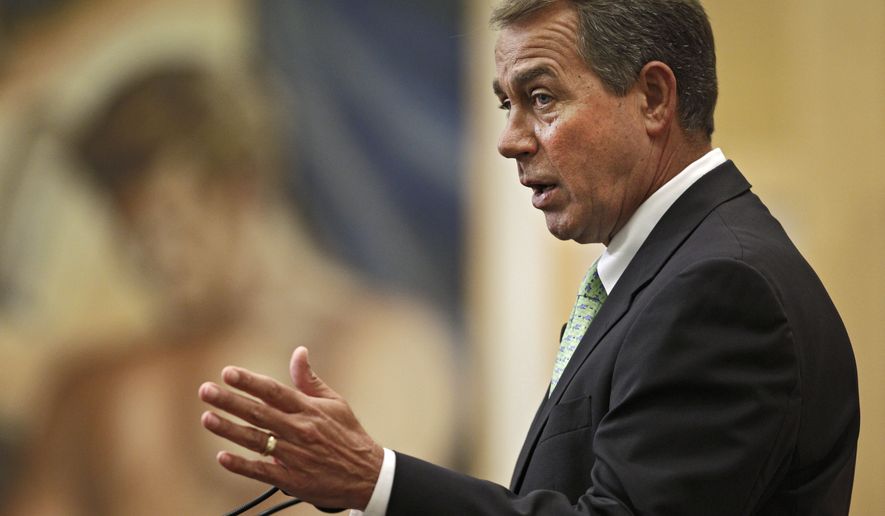The top House Republican said Tuesday it’s “time to put grown-ups in charge” as he called on President Obama to fire his whole economic team, but the White House shot back that Republicans haven’t offered any better solutions to lead the country out of its slump.
The exchange, coming on a day of still more mixed economic news, marked a rhetorical escalation as both sides honed their arguments ahead of an election that Republicans hope, and Democrats fear, will turn on the economy and the poor jobs picture.
“Endless spending sprees, entangled tax structures and bureaucracy run amok - these are all outgrowths of a tired, bloated and broken Washington,” Rep. John A. Boehner said. “Now, more than ever, we need a fresh start that puts power back where it belongs: in the hands of the people.”
Mr. Boehner, an Ohio Republican who likely would become speaker of the House if the GOP wins control of the chamber, used the phrase “job-killing” 12 times to describe the Obama administration’s policies, but never mentioned former President George W. Bush in his morning speech to the City Club of Cleveland.
Democrats, though, said the former president still looms large in this election and argued that Mr. Boehner and fellow Republicans haven’t offered any new solutions to the ballooning spending and sputtering economy.
“Let me tell you, there are millions upon millions of Americans who saw their savings, their paychecks shrink, lost their jobs, their homes,” Vice President Joseph R. Biden Jr. told reporters in responding to the attack. “Mr. Boehner is nostalgic for those good old days, but the American people are not. They don’t want to go back.”
The White House argues that voters still blame Mr. Bush for the sour economy, and polls bear that out. But after 19 months under Mr. Obama, they are increasingly giving the new president poor marks on his efforts to correct the course, despite having passed an initial stimulus package last year and an extension of some stimulus spending earlier this month.
Part of the reason could be that under Mr. Obama, the national debt has grown at a faster rate - reaching $13.36 trillion as of Monday - and the government set a deficit record in 2009, and is poised to come close to that figure in fiscal 2010, which ends next month.
In a Reuters-Ipsos poll released Tuesday, 72 percent of people surveyed said they were very concerned about unemployment and 67 percent were very worried about government spending.
Economic data released Tuesday will fuel both sides of the argument in the coming days.
Existing home sales dropped more than 27 percent in July to their lowest level in 15 years, marking the largest monthly drop since records began to be kept in 1968 and suggesting the administration’s efforts to bolster the real estate market have fallen short.
But the Congressional Budget Office, in its latest report on the stimulus package, lowered its 10-year cost estimate by about $50 billion, from $862 billion down to $814 billion.
The economic effects of the massive spending and tax cuts package are less clear in the report. CBO said the spending is supporting between 1.4 million and 3.6 million jobs right now - a huge range that leaves both sides to see the stimulus as either a success or a failure.
“The Recovery Act is working to rescue the economy from eight years of failed economic policy and rebuild it even stronger than before,” Mr. Biden said in a statement hailing the numbers.
The unemployment rate remains at 9.5 percent, which is 1.5 percentage points higher than the administration said it would go if the stimulus was enacted. But CBO said that without the stimulus, the rate could have been as much as 2 percentage points higher than it is now.
The stimulus’ effects are peaking right now, and by the time voters head to the polls the spending and tax breaks will begin to recede, analysts said.
With that in mind, Mr. Obama this month called for Senate Republicans to end a filibuster against a bill that would create a government-backed lending fund for small businesses. That measure will be the next point of contention when Congress reconvenes after Labor Day.
Republicans fear that if Democrats suffer serious losses, and in particular if they lose control of one or both chambers of Congress, they will use a lame-duck session to try to push through some priorities such as labor-friendly union organizing rules or a bill to rein in greenhouse-gas emissions.
Mr. Boehner challenged Mr. Obama to do an about-face and vow to oppose those efforts.
“President Obama should announce that he will veto any job-killing bills sent to his desk by a lame-duck Congress - including ’card check,’ a national energy tax, and any other tax increases on families and small businesses,” Mr. Boehner said.
In asking the president to oppose parts of his own agenda, Mr. Boehner appeared to be issuing an invitation to Mr. Obama to follow the lead of President Clinton, whose triangulation strategy led to working with centrist Democrats and Republicans, and at times put him at odds with the more liberal elements of the Democratic Party.
Earlier this year, Sen. Lamar Alexander, Tennessee Republican, urged Mr. Obama to try to work more with the GOP this year. He said the president would need the practice heading into next year, when Republicans expect to have more seats and more bargaining power.
• Stephen Dinan can be reached at sdinan@washingtontimes.com.




Please read our comment policy before commenting.